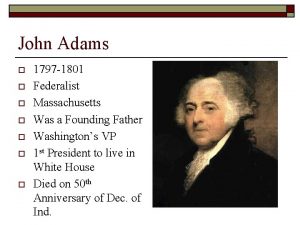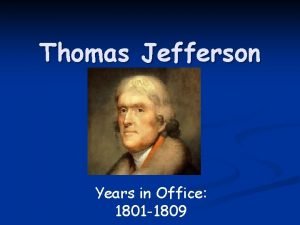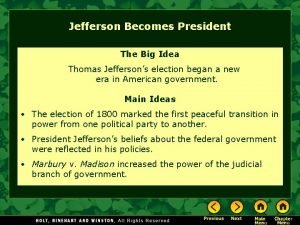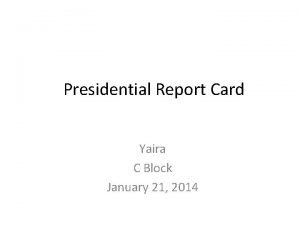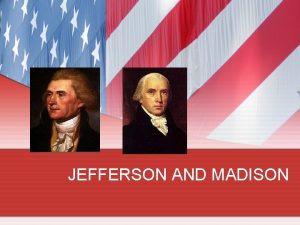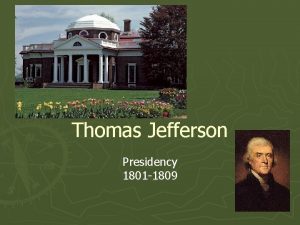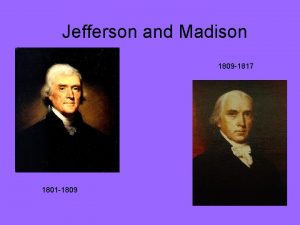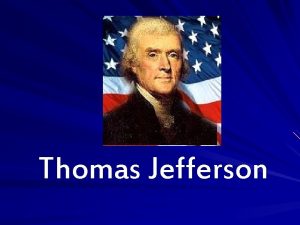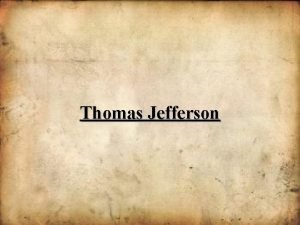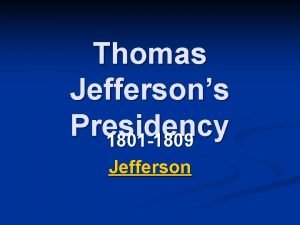THOMAS JEFFERSON 1801 1809 DOMESTIC POLICY Significant domestic








- Slides: 8

THOMAS JEFFERSON 1801 -1809

DOMESTIC POLICY Significant domestic policy: 1. Louisiana Purchase (1803) Bought Louisiana Territory from Napoleon (France) for $15 million. France was fighting a war with Britain and dealing with the Haitian Rebellion, both of which were expensive, so they were willing to sell. Jefferson was primarily interested in the port of New Orleans for trade, but was eager to expand the US (even without Congressional approval). This meant France was almost entirely out of North America. 2. Lewis and Clark Expeditions Jefferson sent Merriweather Lewis (Jefferson’s personal secretary) and William Clark to explore the new Louisiana territory. They document geography, topography, fertility of land.

LOUISIANA PURCHASE

BURR CONSPIRACY There was strong anti-expansionist feelings among the northern Federalists. They realized that as the US expanded westward, the less power they and their region would retain. form a Essex Junto: radical group of MA Federalists who wanted to secede from the Union to “Northern Confederacy”. Conflict over how to get NY to go along with this plan resulted in conflict between Hamilton (leading NY Federalist) and Aaron Burr (candidate for NY Governor in 1804). - Led to a duel in which Burr killed Hamilton - Burr “conspiracy” led him being tried for treason, acquitted by the Marshall Court - illustrated the dangers of a weak central government that could be undermined by ambitious politicians

DOMESTIC POLICY 3. Native American Affairs Tecums eh Under Washington and Adams, the US gov had attempted to secure native lands by treaty, rather than by force. This didn’t work. Jefferson then asked them to give up their lands peacefully, in exchange for farming instruction and “civilized education”. Most tribes resisted – Cherokee were the most successful. Tecumseh v. William Henry Harrison Tecumseh was leader of Shawnee tribe in Ohio Valley and wanted to unify all tribes in the area. His brother, “the Prophet”, had a vision of a unified Indian force fighting against the US gov. The Ohio Valley tribes (assisted by the British) fought the US gov for control over the area. The Native Americans lost and Harrison (gov of “Indian Territory”) became a hero. William Henry Harrison

TECUMSEH AND WILLIAM HENRY HARRISON Tecumseh meeting William Henry Harrison, the governor of Indian Territory (or Indiana) for the first time. The unification of tribes in the Ohio Valley didn’t last long after US troops were sent in to put down Tecumseh and his brother’s movement.

FOREIGN POLICY Significant Foreign Policy Events: 1. Barbary Wars (1801 -1806) Barbary States of North Africa (Morocco, Tripoli, Tunis) were attacking US ships in Mediterranean Sea, demanding payment for travel in the area. Jefferson refused to pay and ordered armed battleships to escort US merchant ships. 2. Conflict with England France (1805 -1812) England was still at war with France, continued impressment (kidnapping of sailors/ships) of US ships, and the US tried to stay neutral. Rather than go to war with either country, Jefferson passed a trade embargo (thinking that this would hurt British and French trade). This hurt US trade and angered US public (esp. Southern

EMBARGO ACT 1807 This political cartoon depicts the frustration Americans had with Jefferson’s embargo on foreign trade. The embargo is represented by a snapping turtle named “Ogrambe”, or “embargo” spelled backwards.


